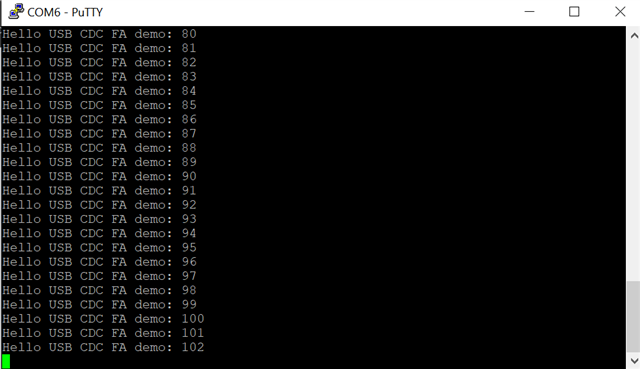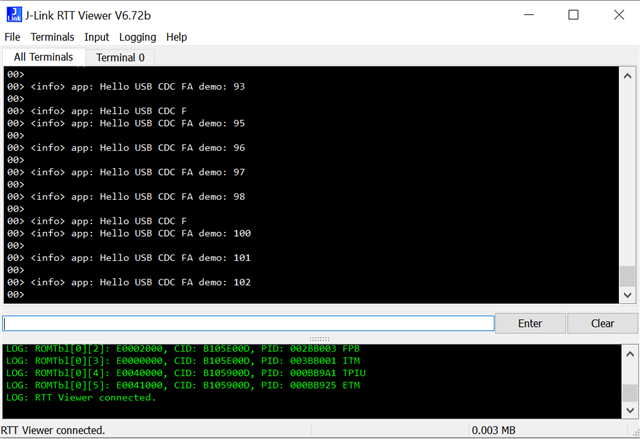Hi!
I'm using the nRF52840 DK with SDK 15.2 and on Windows 10. I have been testing USB communication and while I was testing input and output data, some of the data I was outputting in the RTT viewer with NRF_LOG_INFO() was invalid. What I mean by that is that the data sent through USB into Putty is the same as the data printed with NRF_LOG_INFO():


To produce this, I used the usbd_cdc_acm_pca10056 example. Originally, this example does not print in the Viewer and I had to make some changes to the config file:
#define NRF_LOG_BACKEND_RTT_ENABLED 1 #define NRF_LOG_BACKEND_UART_ENABLED 0
I also added the following to main.c:
NRF_LOG_DEFAULT_BACKENDS_INIT();
That weird output was generated using this:
if(m_send_flag)
{
static int frame_counter;
size_t size = sprintf(m_tx_buffer, "Hello USB CDC FA demo: %u\r\n", frame_counter);
NRF_LOG_INFO("%s", NRF_LOG_PUSH(m_tx_buffer));
ret = app_usbd_cdc_acm_write(&m_app_cdc_acm, m_tx_buffer, size);
if (ret == NRF_SUCCESS)
{
++frame_counter;
}
}I was able to bypass the problem and get normal output when avoiding NRF_LOG_PUSH:
if(m_send_flag)
{
static int frame_counter;
size_t size = sprintf(m_tx_buffer, "Hello USB CDC FA demo: %u\r\n", frame_counter);
NRF_LOG_INFO("Hello USB CDC FA demo: %u", frame_counter);
ret = app_usbd_cdc_acm_write(&m_app_cdc_acm, m_tx_buffer, size);
if (ret == NRF_SUCCESS)
{
++frame_counter;
}
}I find it weird to NRF_LOG_PUSH doesn't work as supposed since it is advised here.
I also tried adding NRF_LOG_FLUSH() after the call to NRF_LOG_PROCESS() but it did improve the output. I also tried adding some delay (thinking that the output would be generated to quickly for RTT Viewer) using both nrf_delay_ms() and nrf_delay_us() and it didn't do anything.
I also linked the config file used and the main source file.
/**
* Copyright (c) 2017 - 2018, Nordic Semiconductor ASA
*
* All rights reserved.
*
* Redistribution and use in source and binary forms, with or without modification,
* are permitted provided that the following conditions are met:
*
* 1. Redistributions of source code must retain the above copyright notice, this
* list of conditions and the following disclaimer.
*
* 2. Redistributions in binary form, except as embedded into a Nordic
* Semiconductor ASA integrated circuit in a product or a software update for
* such product, must reproduce the above copyright notice, this list of
* conditions and the following disclaimer in the documentation and/or other
* materials provided with the distribution.
*
* 3. Neither the name of Nordic Semiconductor ASA nor the names of its
* contributors may be used to endorse or promote products derived from this
* software without specific prior written permission.
*
* 4. This software, with or without modification, must only be used with a
* Nordic Semiconductor ASA integrated circuit.
*
* 5. Any software provided in binary form under this license must not be reverse
* engineered, decompiled, modified and/or disassembled.
*
* THIS SOFTWARE IS PROVIDED BY NORDIC SEMICONDUCTOR ASA "AS IS" AND ANY EXPRESS
* OR IMPLIED WARRANTIES, INCLUDING, BUT NOT LIMITED TO, THE IMPLIED WARRANTIES
* OF MERCHANTABILITY, NONINFRINGEMENT, AND FITNESS FOR A PARTICULAR PURPOSE ARE
* DISCLAIMED. IN NO EVENT SHALL NORDIC SEMICONDUCTOR ASA OR CONTRIBUTORS BE
* LIABLE FOR ANY DIRECT, INDIRECT, INCIDENTAL, SPECIAL, EXEMPLARY, OR
* CONSEQUENTIAL DAMAGES (INCLUDING, BUT NOT LIMITED TO, PROCUREMENT OF SUBSTITUTE
* GOODS OR SERVICES; LOSS OF USE, DATA, OR PROFITS; OR BUSINESS INTERRUPTION)
* HOWEVER CAUSED AND ON ANY THEORY OF LIABILITY, WHETHER IN CONTRACT, STRICT
* LIABILITY, OR TORT (INCLUDING NEGLIGENCE OR OTHERWISE) ARISING IN ANY WAY OUT
* OF THE USE OF THIS SOFTWARE, EVEN IF ADVISED OF THE POSSIBILITY OF SUCH DAMAGE.
*
*/
#include <stdint.h>
#include <stdbool.h>
#include <stddef.h>
#include <stdio.h>
#include "nrf.h"
#include "nrf_drv_usbd.h"
#include "nrf_drv_clock.h"
#include "nrf_gpio.h"
#include "nrf_delay.h"
#include "nrf_drv_power.h"
#include "app_error.h"
#include "app_util.h"
#include "app_usbd_core.h"
#include "app_usbd.h"
#include "app_usbd_string_desc.h"
#include "app_usbd_cdc_acm.h"
#include "app_usbd_serial_num.h"
#include "boards.h"
#include "bsp.h"
#include "bsp_cli.h"
#include "nrf_cli.h"
#include "nrf_cli_uart.h"
#include "nrf_log.h"
#include "nrf_log_ctrl.h"
#include "nrf_log_default_backends.h"
/**
* @brief CLI interface over UART
*/
NRF_CLI_UART_DEF(m_cli_uart_transport, 0, 64, 16);
NRF_CLI_DEF(m_cli_uart,
"uart_cli:~$ ",
&m_cli_uart_transport.transport,
'\r',
4);
/**@file
* @defgroup usbd_cdc_acm_example main.c
* @{
* @ingroup usbd_cdc_acm_example
* @brief USBD CDC ACM example
*
*/
#define LED_USB_RESUME (BSP_BOARD_LED_0)
#define LED_CDC_ACM_OPEN (BSP_BOARD_LED_1)
#define LED_CDC_ACM_RX (BSP_BOARD_LED_2)
#define LED_CDC_ACM_TX (BSP_BOARD_LED_3)
#define BTN_CDC_DATA_SEND 0
#define BTN_CDC_NOTIFY_SEND 1
#define BTN_CDC_DATA_KEY_RELEASE (bsp_event_t)(BSP_EVENT_KEY_LAST + 1)
/**
* @brief Enable power USB detection
*
* Configure if example supports USB port connection
*/
#ifndef USBD_POWER_DETECTION
#define USBD_POWER_DETECTION true
#endif
static void cdc_acm_user_ev_handler(app_usbd_class_inst_t const * p_inst,
app_usbd_cdc_acm_user_event_t event);
#define CDC_ACM_COMM_INTERFACE 0
#define CDC_ACM_COMM_EPIN NRF_DRV_USBD_EPIN2
#define CDC_ACM_DATA_INTERFACE 1
#define CDC_ACM_DATA_EPIN NRF_DRV_USBD_EPIN1
#define CDC_ACM_DATA_EPOUT NRF_DRV_USBD_EPOUT1
/**
* @brief CDC_ACM class instance
* */
APP_USBD_CDC_ACM_GLOBAL_DEF(m_app_cdc_acm,
cdc_acm_user_ev_handler,
CDC_ACM_COMM_INTERFACE,
CDC_ACM_DATA_INTERFACE,
CDC_ACM_COMM_EPIN,
CDC_ACM_DATA_EPIN,
CDC_ACM_DATA_EPOUT,
APP_USBD_CDC_COMM_PROTOCOL_AT_V250
);
#define READ_SIZE 1
static char m_rx_buffer[READ_SIZE];
static char m_tx_buffer[NRF_DRV_USBD_EPSIZE];
static bool m_send_flag = 0;
/**
* @brief User event handler @ref app_usbd_cdc_acm_user_ev_handler_t (headphones)
* */
static void cdc_acm_user_ev_handler(app_usbd_class_inst_t const * p_inst,
app_usbd_cdc_acm_user_event_t event)
{
app_usbd_cdc_acm_t const * p_cdc_acm = app_usbd_cdc_acm_class_get(p_inst);
switch (event)
{
case APP_USBD_CDC_ACM_USER_EVT_PORT_OPEN:
{
bsp_board_led_on(LED_CDC_ACM_OPEN);
/*Setup first transfer*/
ret_code_t ret = app_usbd_cdc_acm_read(&m_app_cdc_acm,
m_rx_buffer,
READ_SIZE);
UNUSED_VARIABLE(ret);
break;
}
case APP_USBD_CDC_ACM_USER_EVT_PORT_CLOSE:
bsp_board_led_off(LED_CDC_ACM_OPEN);
break;
case APP_USBD_CDC_ACM_USER_EVT_TX_DONE:
bsp_board_led_invert(LED_CDC_ACM_TX);
break;
case APP_USBD_CDC_ACM_USER_EVT_RX_DONE:
{
ret_code_t ret;
NRF_LOG_INFO("Bytes waiting: %d", app_usbd_cdc_acm_bytes_stored(p_cdc_acm));
do
{
/*Get amount of data transfered*/
size_t size = app_usbd_cdc_acm_rx_size(p_cdc_acm);
NRF_LOG_INFO("RX: size: %lu char: %c", size, m_rx_buffer[0]);
/* Fetch data until internal buffer is empty */
ret = app_usbd_cdc_acm_read(&m_app_cdc_acm,
m_rx_buffer,
READ_SIZE);
} while (ret == NRF_SUCCESS);
bsp_board_led_invert(LED_CDC_ACM_RX);
break;
}
default:
break;
}
}
static void usbd_user_ev_handler(app_usbd_event_type_t event)
{
switch (event)
{
case APP_USBD_EVT_DRV_SUSPEND:
bsp_board_led_off(LED_USB_RESUME);
break;
case APP_USBD_EVT_DRV_RESUME:
bsp_board_led_on(LED_USB_RESUME);
break;
case APP_USBD_EVT_STARTED:
break;
case APP_USBD_EVT_STOPPED:
app_usbd_disable();
bsp_board_leds_off();
break;
case APP_USBD_EVT_POWER_DETECTED:
NRF_LOG_INFO("USB power detected");
if (!nrf_drv_usbd_is_enabled())
{
app_usbd_enable();
}
break;
case APP_USBD_EVT_POWER_REMOVED:
NRF_LOG_INFO("USB power removed");
app_usbd_stop();
break;
case APP_USBD_EVT_POWER_READY:
NRF_LOG_INFO("USB ready");
app_usbd_start();
break;
default:
break;
}
}
static void bsp_event_callback(bsp_event_t ev)
{
ret_code_t ret;
switch ((unsigned int)ev)
{
case CONCAT_2(BSP_EVENT_KEY_, BTN_CDC_DATA_SEND):
{
m_send_flag = 1;
break;
}
case BTN_CDC_DATA_KEY_RELEASE :
{
m_send_flag = 0;
break;
}
case CONCAT_2(BSP_EVENT_KEY_, BTN_CDC_NOTIFY_SEND):
{
ret = app_usbd_cdc_acm_serial_state_notify(&m_app_cdc_acm,
APP_USBD_CDC_ACM_SERIAL_STATE_BREAK,
false);
UNUSED_VARIABLE(ret);
break;
}
default:
return; // no implementation needed
}
}
static void init_bsp(void)
{
ret_code_t ret;
ret = bsp_init(BSP_INIT_BUTTONS, bsp_event_callback);
APP_ERROR_CHECK(ret);
UNUSED_RETURN_VALUE(bsp_event_to_button_action_assign(BTN_CDC_DATA_SEND,
BSP_BUTTON_ACTION_RELEASE,
BTN_CDC_DATA_KEY_RELEASE));
/* Configure LEDs */
bsp_board_init(BSP_INIT_LEDS);
}
static void init_cli(void)
{
ret_code_t ret;
ret = bsp_cli_init(bsp_event_callback);
APP_ERROR_CHECK(ret);
nrf_drv_uart_config_t uart_config = NRF_DRV_UART_DEFAULT_CONFIG;
uart_config.pseltxd = TX_PIN_NUMBER;
uart_config.pselrxd = RX_PIN_NUMBER;
uart_config.hwfc = NRF_UART_HWFC_DISABLED;
ret = nrf_cli_init(&m_cli_uart, &uart_config, true, true, NRF_LOG_SEVERITY_INFO);
APP_ERROR_CHECK(ret);
ret = nrf_cli_start(&m_cli_uart);
APP_ERROR_CHECK(ret);
}
int main(void)
{
ret_code_t ret;
static const app_usbd_config_t usbd_config = {
.ev_state_proc = usbd_user_ev_handler
};
ret = NRF_LOG_INIT(NULL);
NRF_LOG_DEFAULT_BACKENDS_INIT();
APP_ERROR_CHECK(ret);
ret = nrf_drv_clock_init();
APP_ERROR_CHECK(ret);
nrf_drv_clock_lfclk_request(NULL);
while(!nrf_drv_clock_lfclk_is_running())
{
/* Just waiting */
}
ret = app_timer_init();
APP_ERROR_CHECK(ret);
init_bsp();
init_cli();
app_usbd_serial_num_generate();
ret = app_usbd_init(&usbd_config);
APP_ERROR_CHECK(ret);
NRF_LOG_INFO("USBD CDC ACM example started.");
app_usbd_class_inst_t const * class_cdc_acm = app_usbd_cdc_acm_class_inst_get(&m_app_cdc_acm);
ret = app_usbd_class_append(class_cdc_acm);
APP_ERROR_CHECK(ret);
if (USBD_POWER_DETECTION)
{
ret = app_usbd_power_events_enable();
APP_ERROR_CHECK(ret);
}
else
{
NRF_LOG_INFO("No USB power detection enabled\r\nStarting USB now");
app_usbd_enable();
app_usbd_start();
}
while (true)
{
while (app_usbd_event_queue_process())
{
/* Nothing to do */
}
if(m_send_flag)
{
static int frame_counter;
size_t size = sprintf(m_tx_buffer, "Hello USB CDC FA demo: %u\r\n", frame_counter);
NRF_LOG_INFO("Hello USB CDC FA demo: %u", frame_counter);
ret = app_usbd_cdc_acm_write(&m_app_cdc_acm, m_tx_buffer, size);
if (ret == NRF_SUCCESS)
{
++frame_counter;
}
}
nrf_delay
nrf_cli_process(&m_cli_uart);
UNUSED_RETURN_VALUE(NRF_LOG_PROCESS());
NRF_LOG_FLUSH();
/* Sleep CPU only if there was no interrupt since last loop processing */
__WFE();
}
}
/** @} */
Thanks for looking into this bug!


